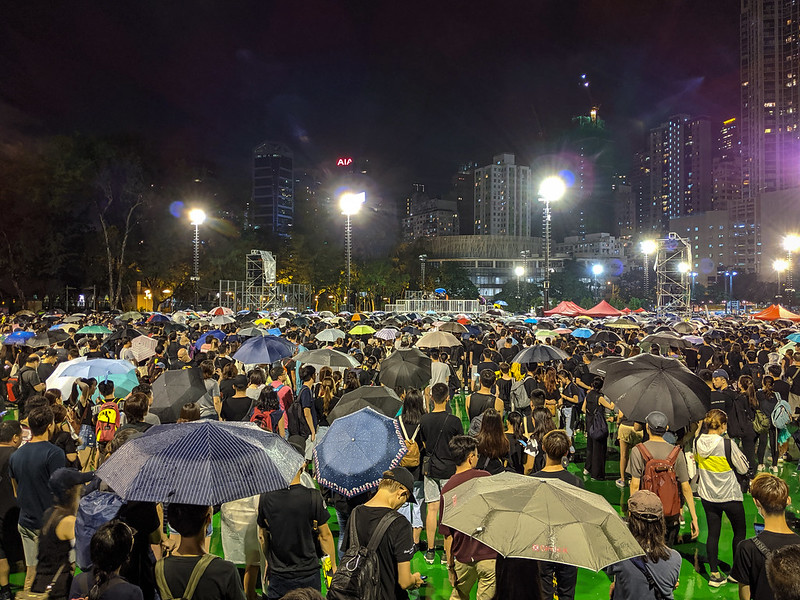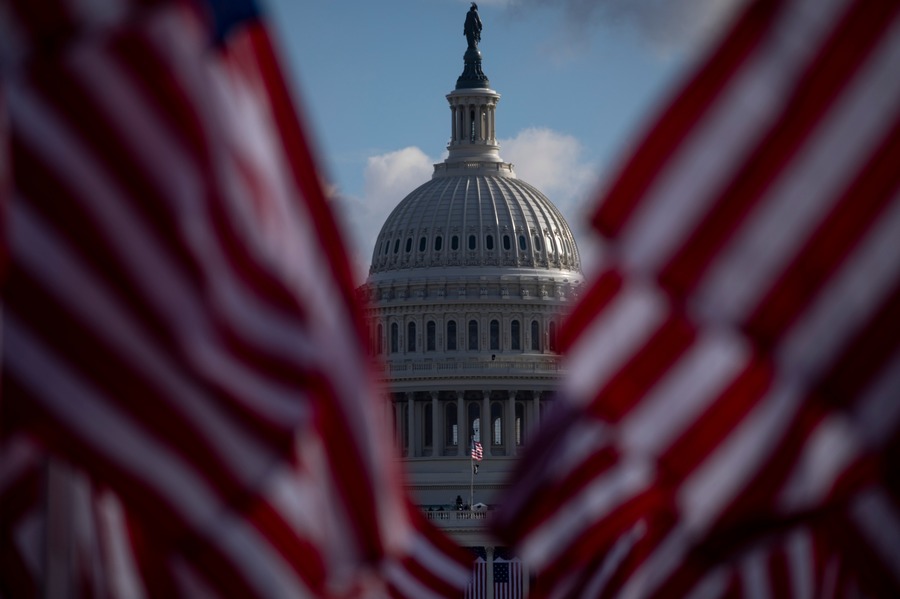The Hong Kong Human Rights and Democracy Act Is Redundant, but Still Worthwhile
The House and the Senate have passed the Hong Kong Human Rights and Democracy Act. What is the significance of the Act?

In a remarkable display of bipartisan unity amid divisive impeachment hearings, near-unanimous majorities of the House and the Senate passed the Hong Kong Human Rights and Democracy Act (HKHRDA) last week, and reports suggest President Trump is likely (though not certain) to sign it. In response, the Chinese foreign minister has denounced the new law as a “slander of China to a level close to madness.” While it is impressive that the HKHRDA achieved such broad support in the face of stiff Chinese government opposition, one should always be a little suspicious when U.S. political leaders agree so completely. In the case of the HKHRDA, that skepticism would be well-founded. The bipartisan consensus obscures the fact that the law is largely redundant: The president already possesses the legal authority to execute the sanctions powers granted to him by the HKHRDA.
This redundancy does not make the HKHRDA meaningless, as I will explain. But it does mean we should understand the law not as a grant of authority to the president, but as an effort to ensure the executive branch exercises all of its economic sanctioning powers to support the Hong Kong pro-democracy movement. For this reason, the real significance of the HKHRDA is not the granting of legal authority but instead the delivery of a political message. That message is that Congress will keep Hong Kong’s pro-democracy movement a central issue in U.S.-China relations no matter what other bilateral issues (such as trade) arise and no matter who prevails in the next presidential election.
The HKHRDA has three legally significant provisions:
1. Annual Certification
Under the Hong Kong Policy Act of 1992, Congress authorized the U.S. government to treat China-owned Hong Kong in exactly the same way that it did when Hong Kong was under British rule. Hong Kong’s special trade and investment status under U.S. law, which was made possible by the 1992 act, made it unusually valuable to China in the early post-1997 handover period. But the 1992 act also held that “whenever the President determines that Hong Kong is not sufficiently autonomous to justify treatment under a particular law of the United States,” he is authorized to suspend such legal treatment.
The HKHRDA leaves this power to change Hong Kong’s status intact, but it requires the U.S. government to annually certify that Hong Kong deserves its special status, and it mandates that Hong Kong address a much longer list of issues than the original 1992 act required (including human rights) in order to maintain its special status.
Prior to the HKHRDA’s passage, the president already had the authority to terminate Hong Kong’s special status. The HKHRDA does not give any new powers to the U.S. executive branch over Hong Kong’s special status. Seen in this light, the HKHRDA is really a message from Congress to the executive branch telling it to consider exercising its power over Hong Kong’s status more seriously than it has in the past. The new act also sets up an annual ritual where the State Department will have to publicly make an assessment of Hong Kong’s progress on addressing certain issues. This very public ritual will be noticed in China and Hong Kong and will thus keep Hong Kong high on the agenda of U.S.-China relations well into the next presidential administration.
2. Visa Protection
The HKHRDA also contains provisions providing certain protections for Hong Kong residents seeking visas to “enter, study, or work” in the United States. Otherwise qualified Hong Kong applicants for U.S. visas “may not be denied primarily on the basis of the applicant’s subjection to politically-motivated arrest, detention or other adverse government action.” In other words, protesters who have been arrested by Hong Kong police over the past five months for “rioting” or other anti-government actions cannot have those arrests used against them in a U.S. visa determination.
This provision of the HKHRDA also has less practical importance than it might seem at first glance. U.S. consular officials have broad discretion when granting or denying visas. Although the HKHRDA calls on the State Department to ensure that consular and diplomatic personnel are trained on this requirement, individual visa applicants cannot, under long-standing U.S. Supreme Court precedent, seek judicial review of a purported violation of this law. Existing U.S. law (§ 212(2)(a)(i) of the Immigration and Nationality Act) also already makes clear that “purely political offenses” cannot be the basis for a visa denial.
Nonetheless, the symbolic importance of this visa provision is hard to overstate. Thousands of students from Hong Kong apply to study in the U.S. every year, and a large proportion of the protesters in Hong Kong are high school or university students. The visa protection provision, even if largely symbolic, sends a targeted message of support to one of the most activist demographic groups in Hong Kong.
3. Targeted Sanctions
The HKHRDA also instructs the president to identify “each foreign person that the President determines is responsible for—extrajudicial detention, arbitrary detention, or torture of any person in Hong Kong, or other gross violations of internationally recognized human rights in Hong Kong.” The law then states that the president “shall” impose economic sanctions on such identified individuals. These sanctions would freeze those persons’ assets in the U.S. and forbid them from doing business with any U.S. person or company. Additionally, the president “shall” deny or revoke visas for such individuals.
These targeted sanctions are modeled on the targeted sanctions first imposed under the Magnitsky Act on the Russians determined to be responsible for the death of a prominent Russian lawyer critical of the Russian government. The thought is that Hong Kong government officials, many of whom travel widely and may have investments in the U.S, would be deterred by the threat of similar targeted sanctions.
But the HKHRDA does not give the president any new powers because Congress expanded the president’s Magnitsky powers in 2017 to apply similar targeted sanctions to human rights offenders in any country, not just in Russia. As with the first section of the HKHRDA that simply reaffirms the Hong Kong Policy Act, the president already has the legal authority to sanction alleged human rights offenders such as Hong Kong’s chief executive and police commissioner.
It is possible that this HKHRDA section may be read to require the president to impose targeted individual sanctions. While the Global Magnitsky Act says the president “may” impose such sanctions, the HKHRDA says the president “shall” impose sanctions on those he determines have violated the HKHRDA’s human rights provisions. But the HKHRDA also gives the president the power to “determine” who has violated those human rights obligations. This structure strongly suggests he has the discretion to refuse to designate anyone as an HKHRDA human rights offender, even if there is substantial evidence of that person’s violations. This legal ambiguity as to whether the president can simply refuse to designate anyone as violating the HKHRDA’s targeted sanctions provisions could become an area of intrabranch conflict if the White House refuses to exercise its authority under this section.
Conclusion
If the HKHRDA is largely symbolic and redundant as a legal matter, is it still worth enacting? My answer is a resounding yes. The political force of a message from a rarely united Congress during this era of impeachment is hard to overstate. China’s foreign ministry has already decried the HKHRDA as an interference in its domestic affairs and threatened countermeasures. Some observers fear the HKHRDA could also undermine the already-threatened U.S.-China trade deal, as President Trump noted in his recent remarks. But those risks of Chinese backlash are exactly why it is worthwhile for Congress to enact this law, even though all it does is give the president powers he already possesses. The HKHRDA tells the Chinese government that President Trump will face a serious domestic political backlash if he tries to trade Hong Kong for better trade relations. This should make it easier for the president to separate Hong Kong policy from the overall trade negotiations The act also confirms that Congress is now deeply committed to ensuring that the U.S. executive branch continues to use its leverage to support democracy and human rights in Hong Kong for years to come. While the Chinese government will never be happy about U.S. pressure over Hong Kong, the HKHRDA shows China that this pressure, and U.S. resolve, is not likely to fade away no matter who is elected president next November.



.jpg?sfvrsn=5a43131e_9)
